As a BetterHelp affiliate, we receive compensation from BetterHelp if you purchase products or services through the links provided
Experiencing anxiety after eating can be a perplexing and uncomfortable sensation, and it’s not as uncommon as we might think. While eating is a necessary part of life and often enjoyable, it can sometimes trigger feelings of unease or anxiety. Understanding why this happens is important for our mental well-being and because it can affect our overall health and eating habits.
Various factors contribute to post-meal anxiety, ranging from physical responses to certain foods, psychological conditions, or even our dietary habits. It’s essential to consider that anxiety after eating doesn’t necessarily signal a mental health condition; it could be a temporary reaction to specific foods or substances. However, when these feelings become persistent or severe, it might indicate a more pressing issue that requires attention. Seeking professional help to diagnose and address these symptoms is an important step toward finding relief.
Key Takeaways
- Eating can sometimes trigger anxiety, which may be due to various factors.
- Post-meal anxiety is not always a sign of a mental health condition but could be a reaction to specific foods.
- Seeking professional help is crucial if anxiety after meals becomes persistent or severe.

Understanding Anxiety and Its Symptoms
In our exploration of anxiety and its effects, we recognize that anxiety isn’t just about feeling nervous; it’s a multi-layered condition that manifests through various symptoms, both psychological and physical.
Generalized Anxiety Disorder
Generalized Anxiety Disorder (GAD) is a mental health condition characterized by persistent and excessive worry about different activities and events. This worry is difficult to control and can significantly affect our daily lives. Among the common triggers for these worries, food and eating habits can sometimes unexpectedly lead to increased anxiety levels.
Symptoms of Anxiety in Detail
- Emotional Symptoms: Often, we find ourselves feeling excessively worried, restless, or on edge. Irritability is another common sign, showing our heightened response to seemingly small issues.
- Cognitive Symptoms: Difficulty concentrating is a telltale symptom we might overlook. It can disrupt our work and personal lives, making tasks more challenging.
Physical Symptoms Associated with Anxiety
Anxiety doesn’t just affect our minds; it has a way of manifesting in our bodies as well. Here’s how:
- Palpitations: This overwhelming rush can make our hearts race unexpectedly.
- Sweating and Dizziness: Anxiety often causes us to sweat more than usual, and we may experience spells of dizziness.
- Trembling: Our hands or body trembling physically reacts to overwhelming feelings.
- Nausea: Yes, sometimes after eating, we might feel nausea, which is directly related to our anxiety levels.
Key Takeaway: Recognizing the range of anxiety symptoms can help us better understand our experiences and seek appropriate support.
 Connection Between Eating and Anxiety
Connection Between Eating and Anxiety
Sometimes, food and feelings get tangled up together. Let’s explore why we feel anxious after eating and what the body might be going through.
Anxiety Symptoms Triggered by Food
Certain foods and drinks can act as triggers for anxiety symptoms. We’re talking caffeine from our morning coffee or refined sugars in that sneaky extra donut. These are known culprits that may cause:
- Nausea: That queasy feeling isn’t just your imagination.
- Lightheadedness: A lighthead can follow a heavy meal.
- Heart palpitations: Sometimes it feels like our heart skipped a beat, and it’s not from romance.
It’s also worth noting that food allergies or sensitivities can bring on these uncomfortable feelings. We might not even know our sensitivity, but our body knows it.
Postprandial Anxiety Phenomenon
Postprandial anxiety, the fancy term for those anxious feelings after eating, can stem from our body’s natural response to certain foods. For instance:
- Digestive issues: A too hearty meal can lead to indigestion or heartburn.
- Blood sugar fluctuations: After a carb-heavy meal, our blood sugar can spiral, potentially leading to feelings of anxiety.
Our body’s complex way of digesting food and regulating hormones can sometimes mimic anxiety’s physical symptoms. It’s not in our heads—it’s a biochemical reaction.
Key Takeaway: Knowing how food affects our mood can help us make better meal choices and better understand our anxiety symptoms.
 Exploring the Causes of Anxiety After Eating
Exploring the Causes of Anxiety After Eating
Sometimes, we might feel anxious after a meal without an apparent reason. This section will unpack a few common triggers for this discomfort.
Food Sensitivities and Allergies
Our bodies can react unexpectedly when we consume foods that don’t sit well with us. For example:
- Gluten and Histamine: If we’re sensitive to gluten or histamine, these substances can cause inflammation or other responses that might trigger anxiety.
- Caffeine: Too much caffeine can mimic the symptoms of anxiety, with side effects like jitters and increased heart rate.
Key Takeaway: If you suspect a food allergy or sensitivity is causing your anxiety, consider speaking with a healthcare professional for tests and advice.
Blood Sugar Levels and Anxiety
Our blood sugar levels can have a significant impact on our mental state.
- Insulin Production: After a high-sugar meal, our insulin skyrockets to balance blood sugar, possibly leading to hypoglycemia, which in turn can trigger anxiety symptoms.
- Sugar Intake: A sudden increase in blood sugar can initially energize us, but the subsequent drop might leave us feeling anxious and jittery.
Key Takeaway: Maintaining stable blood sugar levels through balanced meals is essential to help manage anxiety.
 Stress and its Role in Digestion
Stress and its Role in Digestion
Stress can directly influence our digestive system, affecting how we feel after eating.
- Trauma and Mental Health Conditions: If we’re dealing with trauma or a mental health condition, eating might unintentionally become a stressor, activating our anxiety.
- Digestive Process: Stress can impede the digestive process, possibly resulting in gastrointestinal discomfort and anxiety after eating.
Key Takeaway: Managing stress through techniques like mindfulness or deep-breathing exercises may help alleviate anxiety after eating.
 The Impact of Specific Foods and Substances
The Impact of Specific Foods and Substances
When we eat, we aren’t just satisfying hunger but also fueling our emotions. Certain foods and substances have a direct effect on our mood and anxiety levels.
Caffeine, Sugar, and Anxiety
Caffeine is a stimulant in coffee, tea, chocolate, and soft drinks. While it can boost alertness, too much caffeine can lead to restlessness, heart palpitations, and heightened anxiety. Our bodies respond similarly to sugar. Though it provides a quick energy spike, it is often followed by a crash that can make us nervous or jittery. Here’s what we need to keep in mind:
- Caffeine:
- Can cause insomnia, making us more susceptible to anxiety.
- May increase heart rate, simulating sensations of anxiety.
- Sugar:
- Consuming high amounts of sugar may lead to fluctuations in blood sugar levels, which can trigger anxiety symptoms.
- Refined carbohydrates, like those in white flour products, can have a similar effect due to their high sugar content.
Key Takeaway: It’s wise to moderate our caffeine and sugar intake to maintain steadier energy levels and avoid anxiety peaks.
 Alcohol, Additives, and Mental Health
Alcohol, Additives, and Mental Health
Alcohol may seem like a stress reliever, but it can worsen anxiety in the long run. It interferes with our brain chemistry and sleep patterns, which can make anxiety harder to manage. Processed foods and additives also play a role. They can contain chemicals that affect our brains and mood. Here’s a detailed look:
- Alcohol:
- Can disrupt the balance of neurotransmitters in our brain, which regulates mood.
- It affects sleep quality, which is crucial for managing anxiety.
- Additives and Processed Foods:
- Foods with additives may include unnecessary chemicals that could affect our mental health.
- Processed foods often lack the nutrients our brains need to manage stress and may contain high sugar levels and refined carbohydrates.
- Histamine-Rich Foods:
- Items like cheese, fermented foods, and cured meats are high in histamines, which can trigger anxiety in sensitive individuals.
Key Takeaway: We’re better off reducing our alcohol intake and being mindful of additives and processed foods to support our mental well-being.
 Psychological Factors and Eating Habits
Psychological Factors and Eating Habits
Our relationship with food is complex and deeply entwined with our psychological state. Let’s examine how specific mental health challenges can influence our eating behaviors and potentially lead to feelings of anxiety post-meal.
Eating Disorders and Anxiety
Eating disorders such as anorexia nervosa, bulimia nervosa, and binge eating disorder often arise from a mix of psychological issues like body image concerns, perfectionism, and trauma. It’s no wonder that anxiety can spike after eating when we’re caught in such a struggle:
- Anorexia Nervosa: Worries about weight and a distorted body image can lead to extreme food restriction, and eating even a small amount can trigger significant anxiety.
- Bulimia Nervosa: The cycle of binging and purging can cause immense stress due to feelings of loss of control and intense worry about body shape.
- Binge Eating Disorder: Consuming large amounts of food can evoke feelings of shame or guilt, contributing to heightened anxiety post-meal.
Key Takeaway: Acknowledging how these disorders impact our emotions can be a step toward seeking appropriate help and reducing post-meal anxiety.
 Emotional Eating and Anxiety Reactions
Emotional Eating and Anxiety Reactions
Emotions can drive us to eat when we’re not physically hungry, leading to ’emotional eating.’ This habit often serves as a coping mechanism for stress, anxiety, or distressing feelings, with a noteworthy link to our anxiety levels:
- Trauma and Anxiety: Trauma can significantly affect eating habits. For some, turning to food for comfort might be a response to unprocessed trauma, leading to anxiety after eating.
- Coping Strategies: While food can be a source of momentary relief, using it as a primary coping strategy can foster a negative cycle where anxiety follows eating as a consequence.
Key Takeaway: Identifying emotional triggers can be beneficial in learning healthier ways to cope with anxiety that doesn’t involve turning to food for comfort.
Diagnosis and Professional Assessment
When we experience anxiety after eating, it’s essential to get a proper diagnosis to understand the underlying causes. Seeking advice from mental health professionals and doctors can guide us on the right path towards managing these feelings.
 Identifying Anxiety Disorders
Identifying Anxiety Disorders
Anxiety disorders can manifest in various forms, including generalized anxiety disorder. Here’s what we should look for:
- Physical Symptoms: Rapid heartbeat, sweating, or dizziness after eating.
- Behavioural Changes: Avoidance of certain foods or social eating scenarios.
- Emotional Signs: Intense worry or fear associated with eating or after a meal.
To pin down the diagnosis, a mental health professional or therapist will use a strategic combination of:
- Clinical interviews.
- Questionnaires or psychological inventories.
Key Takeaway: Anxiety disorders can be complex, but recognizing the signs can lead us to seek specialized help and start our journey to recovery.
Recognizing Eating Disorders
Eating disorders, such as ARFID (Avoidant/Restrictive Food Intake Disorder), require careful attention. Signs to watch out for include:
- Disrupted Eating Patterns: Persistent lack of interest in eating or aversion toward certain foods.
- Weight Fluctuations: Significant weight loss or gain unrelated to diet attempts.
- Psychological Components: Fear of choking or vomiting as a result of eating.
A professional diagnosis typically involves:
- A detailed evaluation by a doctor.
- Referrals to specialists in eating disorders.
- Comprehensive physical exams and laboratory tests.
Key Takeaway: Eating disorders are serious, but with early detection, we can work towards effective treatment plans and support systems.
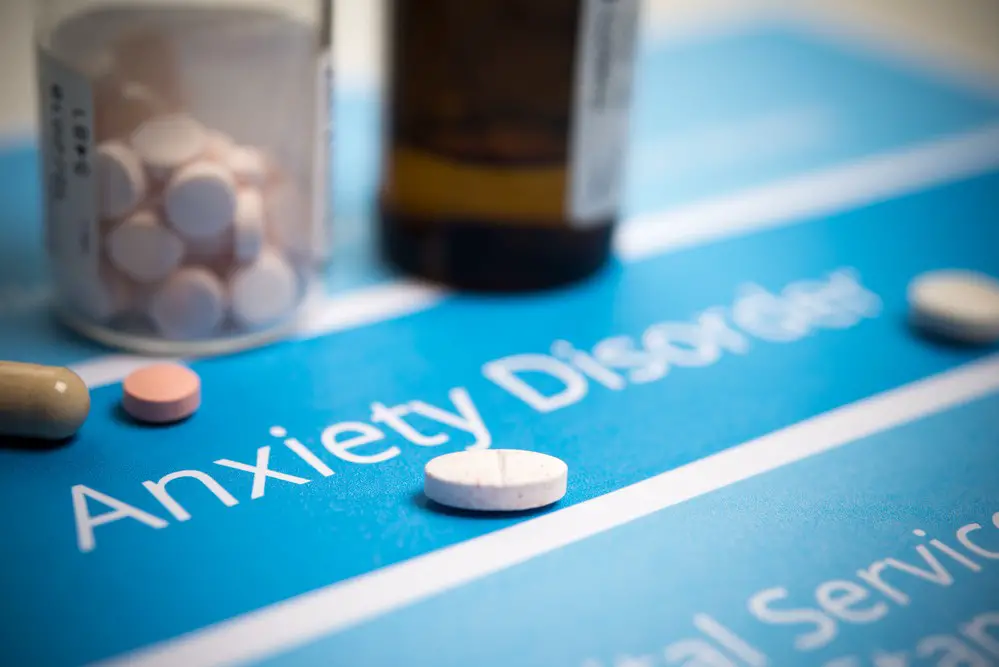
Effective Treatments and Therapies
When we notice anxiety after eating, we must consider effective treatments and therapies that can help manage symptoms and improve our well-being.
Medical Treatments for Anxiety
Anxiety related to eating can be addressed with specific medications, which a doctor can prescribe. We should understand that there is no one-size-fits-all treatment; it’s tailored to each individual’s needs.
- Selective Serotonin Reuptake Inhibitors (SSRIs) and Serotonin-Norepinephrine Reuptake Inhibitors (SNRIs) are often prescribed to alleviate the symptoms of anxiety. These can take a few weeks to become effective, but many find them incredibly helpful.
- Some may benefit from anti-anxiety medications, like benzodiazepines, for short-term relief. However, they should be used with caution due to potential dependence.
- Beta-blockers can sometimes be used off-label to manage physical symptoms of anxiety, such as palpitations.
Key Takeaway: Consulting a healthcare provider about medications can be a significant first step toward managing anxiety after eating.
 Therapy Options for Eating Disorders
Therapy Options for Eating Disorders
Different forms of therapy, guided by professionals, exist for those of us grappling with an eating disorder that may be contributing to anxiety.
- Cognitive Behavioral Therapy (CBT) helps us recognize and alter negative thought patterns and behaviors around eating.
- Dialectical Behavior Therapy (DBT) can assist in managing emotions and reducing self-destructive behaviors, improving our relationship with food.
- Nutritional counseling is a strategy where dieticians work with us to develop a balanced relationship with food and body image.
- Support from support groups provides a community of individuals who can relate to our experience, offering a sense of belonging and understanding.
Key Takeaway: Professional guidance through therapy can support us in untangling the complex feelings associated with eating and anxiety.
 Self-Help Strategies and Coping Mechanisms
Self-Help Strategies and Coping Mechanisms
Managing anxiety after eating involves both addressing our diet and finding ways to reduce stress. Let’s explore how simple changes in these areas can profoundly impact our well-being.
Dietary Adjustments and Nutrition
We can start by examining our eating habits—what we eat is as important as how we eat. Here’s how we can ensure our diet supports our mental health:
- Eat Balanced Meals: Include a variety of nutrients in our meals. A balanced diet helps maintain stable blood sugar levels, which can mitigate anxiety symptoms.
- Monitor Food Triggers: Keep a diary to identify foods that trigger anxiety. Once we know the culprits, we can modify our diet accordingly.
- Seek Professional Advice: Consulting a dietitian can be immensely helpful. They can guide us toward an eating plan that meets our body’s needs.
- Include Probiotics and Magnesium: Incorporate foods rich in probiotics and magnesium. These can contribute to a healthy gut and may reduce anxiety.
Key Takeaway: Adjusting what we eat and getting sufficient nutrients is a decisive step toward reducing post-meal anxiety.
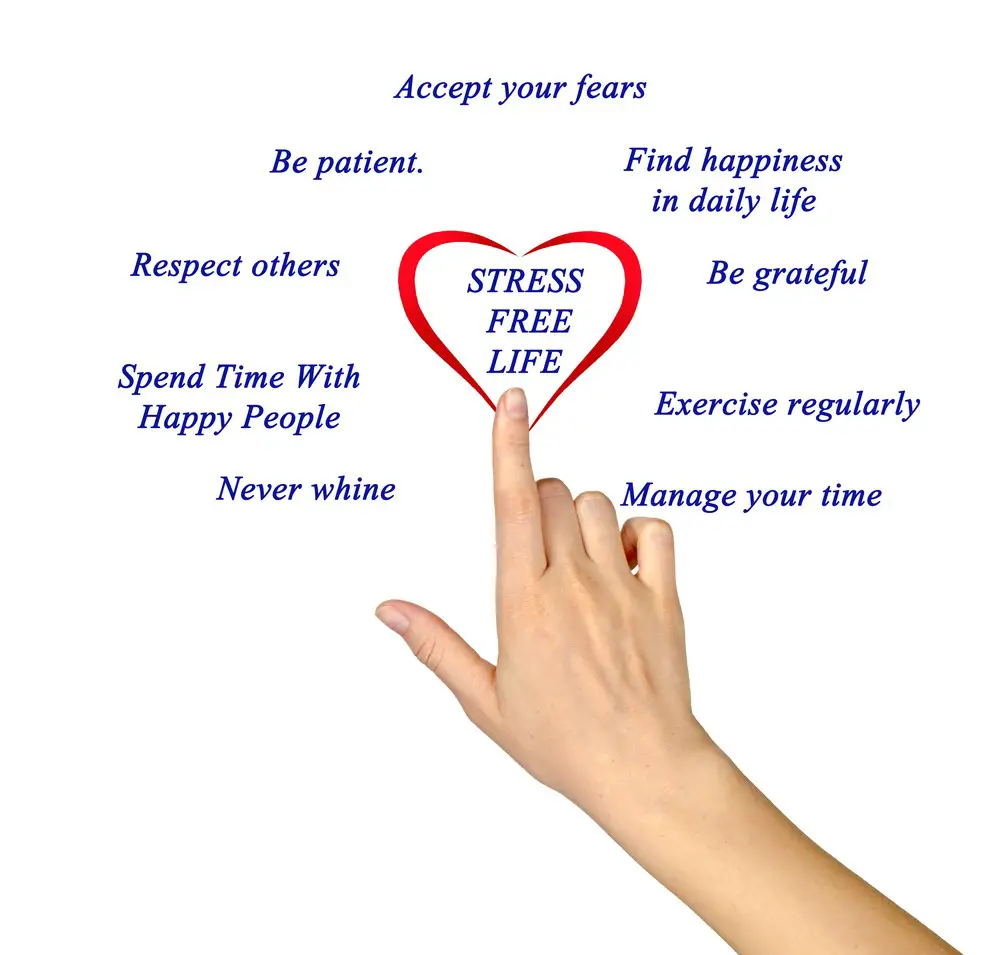
Stress Management and Relaxation Techniques
Dealing with stress is crucial. Let’s look at some techniques that can help us unwind and improve our stress response:
- Develop a Relaxation Routine: Engage in activities like deep breathing, meditation, or yoga. These practices can help calm our mind and body.
- Prioritize Sleep: Make sure to get enough rest. Good sleep habits are critical for coping with stress.
- Stay Active: Regular exercise can help manage weight gain and stress levels. It can boost our mood and reduce feelings of anxiety.
- Set Aside Time for Ourselves: Dedicate time to hobbies or activities we enjoy. Taking a break can help us recharge and better manage stress.
Key Takeaway: Implementing effective stress management and relaxation techniques significantly benefits our mental health and helps us cope with anxiety.
The Role of Exercise and Lifestyle Changes
When we face anxiety after eating, it’s crucial to consider the influence of our overall lifestyle. Regular exercise and adjustments in our daily habits have a significant role in managing our health and well-being. Let’s unpack how these elements play a part in treatment and coping with post-meal anxiety.
Exercise: A Key Player in Easing Anxiety
- Boosts Mood: Engaging in physical activity releases endorphins, our body’s natural mood lifters.
- Reduces Physical Symptoms: Exercise helps reduce tension and fatigue, contributing to anxiety.
- Promotes Weight Management: Maintaining a healthy weight through activity can lessen the worry associated with eating and body image.
Lifestyle Changes for Better Coping:
- Improved Sleep Habits: Establishing a routine can enhance sleep quality, combatting sleep-related anxiety.
- Mindful Eating:
- Eating slowly allows us to enjoy our meals without rushing, reducing the gastrointestinal distress that might lead to anxiety.
- Focusing on the experience of eating can help us stay attuned to our body’s signals of fullness and satisfaction.
Balanced Approach:
- Combine different forms of exercise like aerobic, strength training, and flexibility workouts.
- Integrate rest days to allow our bodies to recover and avoid burnout.
Key Takeaway:
Incorporating regular exercise and mindful lifestyle habits into our routine can drastically improve our ability to cope with anxiety following meals, leading to better health and a more balanced life.
When to Consult a Healthcare Provider
If we notice that anxiety symptoms consistently emerge after eating, it’s crucial to consider our overall health. Our bodies often signal us when it’s time to seek professional support. Here’s when to reach out to a healthcare provider:
- Persistent Anxiety: When worry doesn’t subside and starts affecting our day-to-day life.
- Physical Symptoms: Manifestations like heart palpitations, dizziness, or trouble breathing post-meal.
- Eating Patterns: A shift in how much or little we’re eating, potentially due to anxiety.
We should consult with a doctor or mental health professional under these circumstances. They can help diagnose the underlying causes, whether related to nutrition, a health condition, or an anxiety disorder.
To ensure a comprehensive approach:
- Record Symptoms: Keep a log of what we eat and the anxiety symptoms we experience.
- Seek Guidance: A mental health professional can navigate us toward appropriate therapy.
- Nutritional Advice: Contact a nutrition expert for an eating plan that best supports our health.
- Medical Examination: Sometimes, it’s vital to rule out physical health issues through a check-up.
Key Takeaway: When anxiety after eating interferes with our wellness, it’s time to get professional advice. These experts can help explore the cause and tailor treatment to our needs, ensuring we are on a path to better health and comfort.
Frequently Asked Questions
In this section, we cover some common inquiries regarding the sensations of anxiety after meals, exploring potential causes and offering guidance on managing symptoms.
What could cause feelings of anxiety after consuming a meal?
We often overlook the intricate connection between our diet and mental health. Certain foods and additives can stimulate physical responses that mimic anxiety. For instance, caffeine and alcohol can both increase heart rate and nervousness. Additionally, if we eat too large a portion, our body’s natural response to digest the food may also cause symptoms that feel like anxiety.
Key Takeaway: Diet and portion size can influence anxiety-like symptoms.
Can sugar intake lead to increased anxiety levels?
Yes, sugar can play a role. Consuming high sugar can rapidly spike and drop in blood sugar levels. This drop, known as hypoglycemia, can create a feeling of jitteriness and unease, which may be perceived as anxiety.
Key Takeaway: Manage sugar intake to help stabilize mood fluctuations.
Are there particular foods that are known to trigger anxiety or panic attacks?
Certain foods can trigger anxiety or panic attacks, especially in sensitive individuals. These can include:
- Caffeine: May cause heart palpitations and restlessness.
- Alcohol: Can alter mood and lead to heightened anxiety.
- Processed foods: High in additives and low in nutrients, they may negatively affect mood stability.
Key Takeaway: Be mindful of caffeine, alcohol, and processed food consumption.
What symptoms might someone experience if they have a panic attack while eating?
During a panic attack, while eating, one might experience:
- A rapid heartbeat or palpitations.
- Shortness of breath or a feeling of choking.
- Dizziness or lightheadedness, often coupled with a sense of impending doom.
Key Takeaway: Recognize these symptoms early to manage panic attacks effectively.
Why do some individuals feel anxious when eating in social settings?
Social settings can be overwhelming, triggering our body’s fight-or-flight response. Concerns about judgment or behaving inappropriately can provoke anxiety. People may also have a fear of choking or experiencing a panic attack in public.
Key Takeaway: Social anxiety can contribute to anxious feelings during communal meals.
How can one manage or reduce anxiety that occurs before meals?
We can take several steps to reduce mealtime anxiety:
- Practice mindfulness or deep breathing exercises before eating.
- Keep portions reasonable and eat slowly.
- Plan balanced meals to maintain steady blood sugar levels.
Key Takeaway: Mindfulness and meal planning go a long way in anxiety management.
- How to Transform a Home’s Patio Space into a Relaxing Space - March 23, 2025
- 5 Strategies to Use a Cell Phone to Help Manage Your Stress - March 23, 2025
- 4 Ways to Use Measurements to Create a Relaxing Sleep Space - March 23, 2025
This site contains affiliate links to products. We will receive a commission for purchases made through these links.


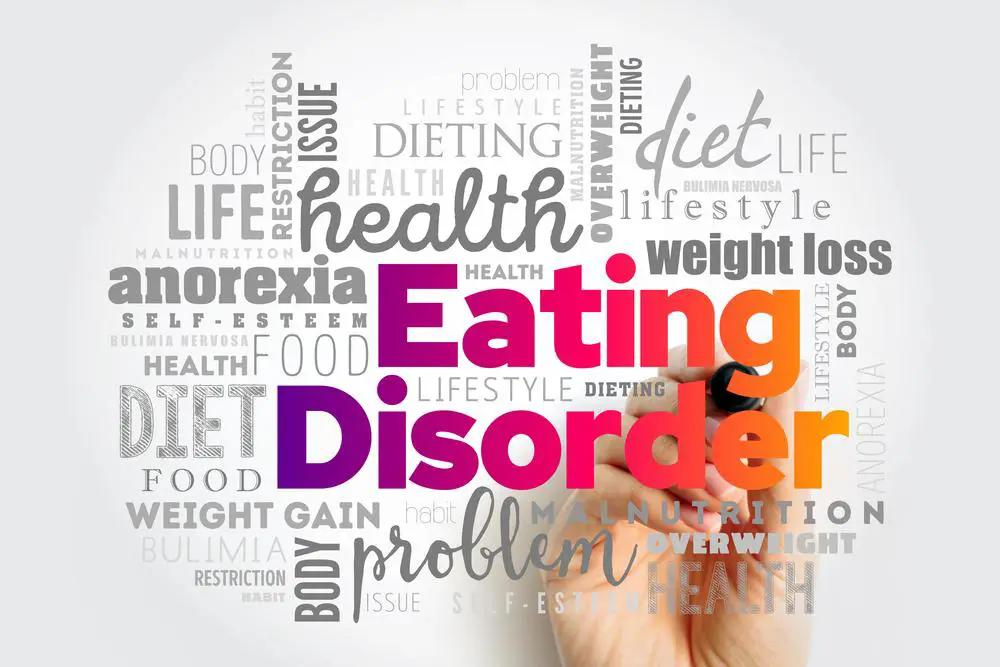 Connection Between Eating and Anxiety
Connection Between Eating and Anxiety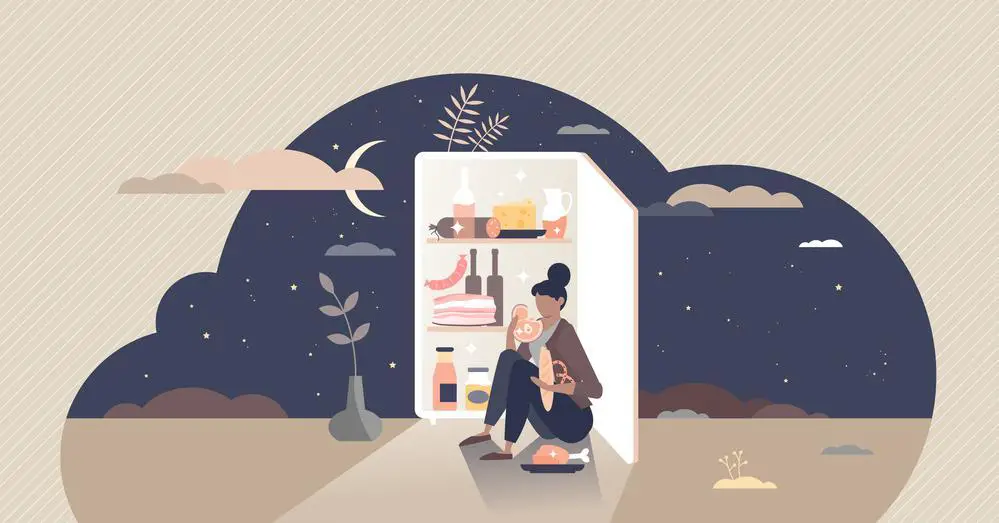 Exploring the Causes of Anxiety After Eating
Exploring the Causes of Anxiety After Eating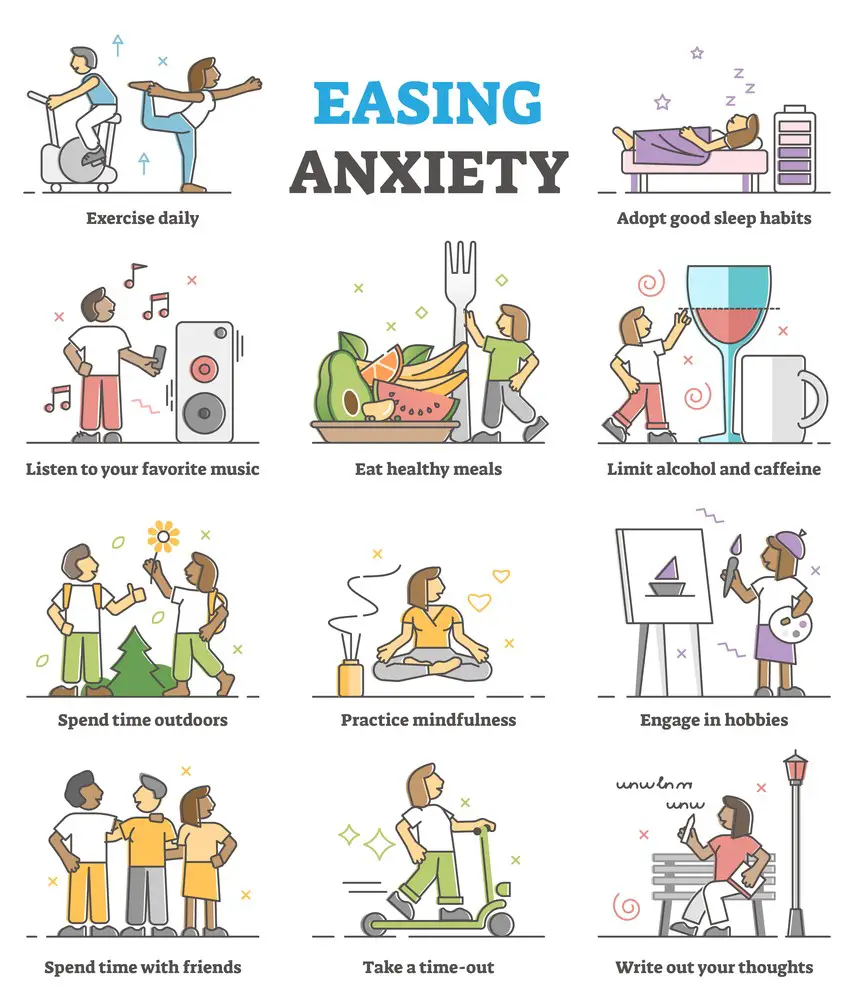 Stress and its Role in Digestion
Stress and its Role in Digestion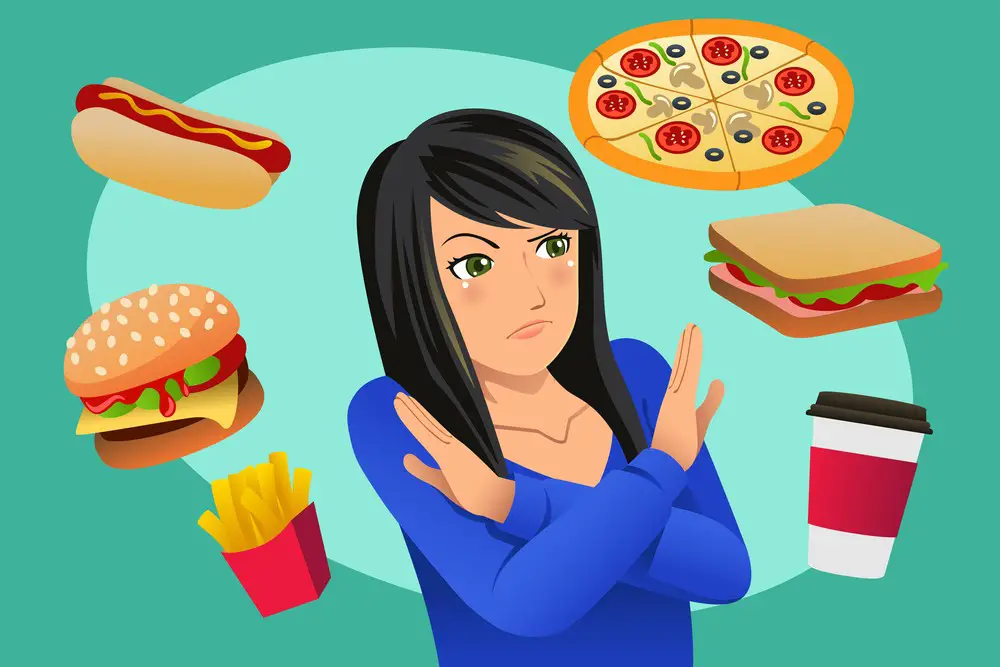 The Impact of Specific Foods and Substances
The Impact of Specific Foods and Substances Alcohol, Additives, and Mental Health
Alcohol, Additives, and Mental Health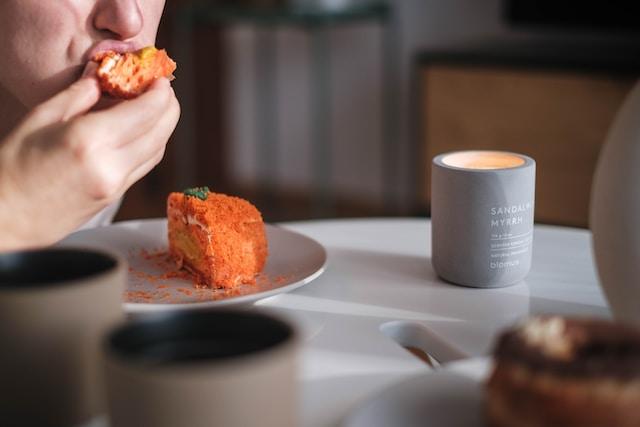 Psychological Factors and Eating Habits
Psychological Factors and Eating Habits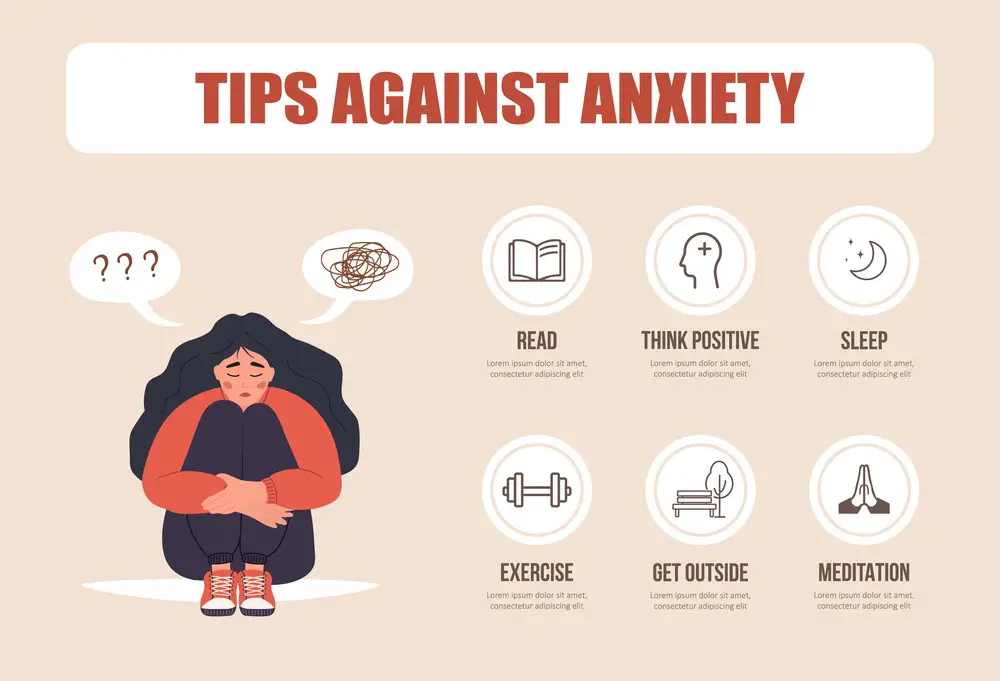 Emotional Eating and Anxiety Reactions
Emotional Eating and Anxiety Reactions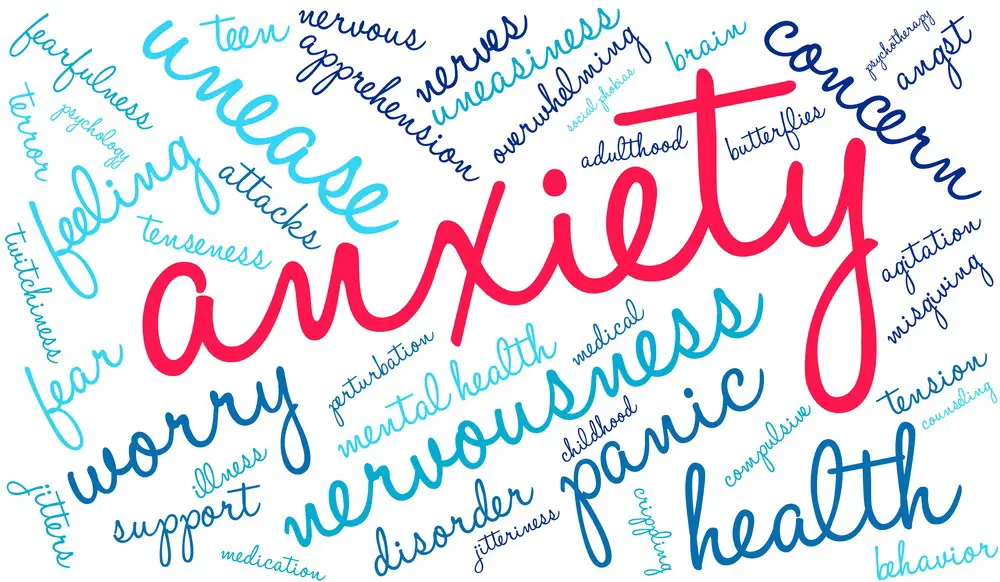 Identifying Anxiety Disorders
Identifying Anxiety Disorders Therapy Options for Eating Disorders
Therapy Options for Eating Disorders Self-Help Strategies and Coping Mechanisms
Self-Help Strategies and Coping Mechanisms
